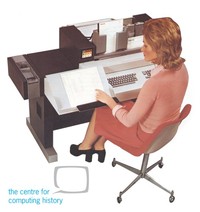My first summer job and what's the deal with those magnetic ledger cards
Wednesday, July 2, 2014
My first summer job and what's the deal with those magnetic ledger cards
Thirty years ago, on July 2, 1984, I started my first summer job in the accounting department of Gebrüder Ulmer, a hardware retailer and wholesale firm.
The little I remember from those days are fixed working hours from 8–12 and 14–18, with sufficient time for a lunch break at home, handwritten memos, a plethora of documents arriving every few hours that needed to be stamped, sorted, numbered, processed and forwarded to the next department or stored in the archive, and the mix of historic and then-modern business machines.
My responsibilities were mostly sorting and archiving documents, and typing letters on an ancient mechanical Underwood typewriter.
 The most advanced device was “the accounting machine”, most likely a Philips P354 Visible Records Computer or similar. Accounting information was stored on large Magnetic Ledger Cards, with transactions getting recorded on a magnetic stripe as well as printed on the card, so one could easily access the information without a computer. Transactions were recorded on individual customer and supplier account cards, and the totals got transferred to the general ledger cards automatically at the end.
The most advanced device was “the accounting machine”, most likely a Philips P354 Visible Records Computer or similar. Accounting information was stored on large Magnetic Ledger Cards, with transactions getting recorded on a magnetic stripe as well as printed on the card, so one could easily access the information without a computer. Transactions were recorded on individual customer and supplier account cards, and the totals got transferred to the general ledger cards automatically at the end.
The accounting system was eventually re-implemented on an IBM System/36 minicomputer, and later ported to the IBM AS/400. As a teenager who proudly owned a Commodore 64, these big irons were quite impressive and a motivation to know more about business computing, data modelling and programming languages. (I still have a copy of the COBOL 78 manual, just in case.)
In the thirty years since my first summer job, there have been tremendous changes. No longer do most of us work fixed working hours, rarely do we exchange handwritten memos, and data processing usually means instantaneously and electronically, not in paper batches.
I am grateful for what I learned during my first summer job and during my professional career since, and looking forward to the next big shifts ahead.
Photo courtesy of The Centre for Computing History - Computer Museum, http://www.computinghistory.org.uk/det/505/philips-p354-visible-records-computer/
The little I remember from those days are fixed working hours from 8–12 and 14–18, with sufficient time for a lunch break at home, handwritten memos, a plethora of documents arriving every few hours that needed to be stamped, sorted, numbered, processed and forwarded to the next department or stored in the archive, and the mix of historic and then-modern business machines.
My responsibilities were mostly sorting and archiving documents, and typing letters on an ancient mechanical Underwood typewriter.

The accounting system was eventually re-implemented on an IBM System/36 minicomputer, and later ported to the IBM AS/400. As a teenager who proudly owned a Commodore 64, these big irons were quite impressive and a motivation to know more about business computing, data modelling and programming languages. (I still have a copy of the COBOL 78 manual, just in case.)
In the thirty years since my first summer job, there have been tremendous changes. No longer do most of us work fixed working hours, rarely do we exchange handwritten memos, and data processing usually means instantaneously and electronically, not in paper batches.
I am grateful for what I learned during my first summer job and during my professional career since, and looking forward to the next big shifts ahead.
Photo courtesy of The Centre for Computing History - Computer Museum, http://www.computinghistory.org.uk/det/505/philips-p354-visible-records-computer/
Labels: personal, technology